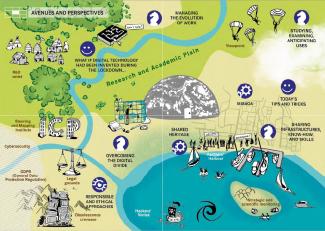Digital Roadmap
The Digital roadmap at a glance
A map
The 2020 BnF Digital roadmap consists of a large map ready to be explored.
It is made of eight large regions, one of them being double: “digital collections”, “data”, “infrastructures”, “collections processing”, “avenues and perspectives”, “technologies”, “exploring and sharing resources” (double region), “metadata management and catalogues”.
On the central region, “avenues and perspectives”, you can see 9 round pictograms, each of them echoing an additional fact sheet.
10 highlights stand out: Digital legal deposit, Digital collections, Digitisation, Data, Working environment, Digital hospitality, Text and data mining tools, Gallica, General catalogue, Metadata management.
… and a set of cards
The map is supplemented by forty fact sheets (in French) which provide short syntheses, links and contacts for anyone looking for more information.
In these cards are developed the main issues, actions, and strategic priorities of the National Library of France’s regarding digital technologies and uses.
The whole set is organised into six categories of cards:
The different cards are linked to each other. Thanks to their coordinates (for instance [A3]), they can be located on the map.
Must-see spots on the digital roadmap
This itinerary offers several landmarks to discover the BnF’s digital collections, the means of accessing them, and how they’re preserved.
Five strategic priorities of the 2020 digital roadmap
- Managing the evolution of work
- Studying, examining, anticipating uses
- Sharing infrastructures, know-how, and skills
- Managing information technology applications
- Overcoming the digital divide
Insight: a network era
In 2016, the previous edition of the Digital roadmap stressed how digital technologies were fully adopted at the BnF regarding bibliographic metadata management and digital collections preservation. What was at stake was putting content into perspective and developing new services for users.
2020 shows that we live in an era of networks. Librarians are surrounded by a fully digital environment, use digital tools in their interactions, making them rather focus on the issue of relationships:
- with users and partners: the BnF pays more and more attention to its users’ needs and practices, and works with many partners to extend digital legal deposit, to overhaul its cooperation tools, etc.
- with machines: automation, data flow processing, artificial intelligence experiments make professional and public uses evolve and give rise to new issues and challenges
- with technologies themselves: Library staff and users need agile solutions to be able to work remotely, for example. During 2020’s health crisis, the digital divide has never been so acute. That’s why the Library intends to digitally support people and has defined the digital working environment project as a key priority.
Against such a background, the Library creates open infrastructures and tools by design, following the example of Gallica vanilla. Openness, sharing, sustainability, sobriety, ethics, are its leitmotivs.
Vision for the future
The following approaches are closely linked to the founding missions of the BnF and to its obligations as a major public actor, particularly in the fields of data processing, information dissemination, privacy, and sustainable development.
- Ever more accessible
- Responsible and ethical approaches
- Towards renewed catalogues and cataloguing
- The foundations of digital heritage of the 21st century
- A library devoted to long-term digital preservation worldwide
An itinerary through the fundamentals of AI
This itinerary is your ultimate travel companion in the BnF’s Digital Roadmap on the footsteps of Artificial Intelligence (AI)!






